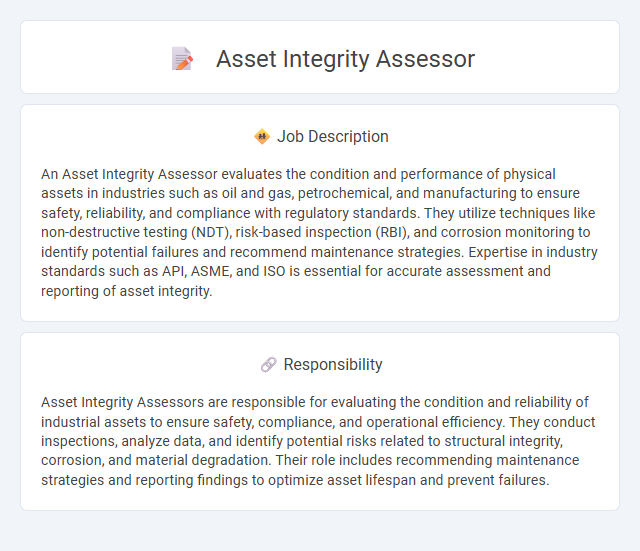
An Asset Integrity Assessor evaluates the condition and performance of physical assets in industries such as oil and gas, petrochemical, and manufacturing to ensure safety, reliability, and compliance with regulatory standards. They utilize techniques like non-destructive testing (NDT), risk-based inspection (RBI), and corrosion monitoring to identify potential failures and recommend maintenance strategies. Expertise in industry standards such as API, ASME, and ISO is essential for accurate assessment and reporting of asset integrity.
Candidates with strong attention to detail and a solid understanding of industry standards are likely suitable for the Asset Integrity Assessor role. Those who demonstrate excellent analytical skills and the ability to evaluate complex systems may perform well in assessing asset conditions. Individuals lacking technical knowledge or the ability to manage thorough inspections might face challenges adapting to this position.
Qualification
Asset Integrity Assessors typically require a degree in engineering disciplines such as mechanical, civil, or petroleum engineering, combined with certifications in asset integrity management. Extensive experience in risk assessment, inspection techniques, and maintenance strategies within oil and gas, petrochemical, or energy sectors is essential. Proficiency in industry standards like API, ISO, and ASME ensures proper evaluation and mitigation of structural and operational risks.
Responsibility
Asset Integrity Assessors are responsible for evaluating the condition and reliability of industrial assets to ensure safety, compliance, and operational efficiency. They conduct inspections, analyze data, and identify potential risks related to structural integrity, corrosion, and material degradation. Their role includes recommending maintenance strategies and reporting findings to optimize asset lifespan and prevent failures.
Benefit
An Asset Integrity Assessor likely enhances the reliability and safety of critical infrastructure by identifying potential risks and recommending preventive measures. This role probably reduces downtime and maintenance costs through early detection of asset degradation. Organizations employing Asset Integrity Assessors may experience improved compliance with regulatory standards and increased operational efficiency.
Challenge
The role of an Asset Integrity Assessor likely involves the challenge of maintaining the safety and reliability of critical infrastructure under varying operational conditions. Assessors probably face the complexity of identifying potential risks and degradation mechanisms while ensuring compliance with industry standards. The position demands a keen attention to detail and the ability to interpret technical data to prevent equipment failure and extend asset lifespan.
Career Advancement
Asset Integrity Assessors play a critical role in ensuring the safety and reliability of industrial facilities, which positions them for rapid career advancement in sectors like oil and gas, manufacturing, and engineering consulting. Mastery of industry standards such as API, ISO, and NACE, combined with expertise in inspection technologies and risk assessment methodologies, enhances opportunities for promotions to senior assessor, integrity manager, or technical advisor roles. Continuous professional development and certifications in integrity management or non-destructive testing (NDT) further accelerate career growth in this high-demand field.
 kuljobs.com
kuljobs.com